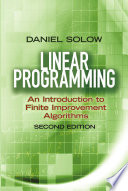

Most ebook files are in PDF format, so you can easily read them using various software such as Foxit Reader or directly on the Google Chrome browser.
Some ebook files are released by publishers in other formats such as .awz, .mobi, .epub, .fb2, etc. You may need to install specific software to read these formats on mobile/PC, such as Calibre.
Please read the tutorial at this link: https://ebookbell.com/faq
We offer FREE conversion to the popular formats you request; however, this may take some time. Therefore, right after payment, please email us, and we will try to provide the service as quickly as possible.
For some exceptional file formats or broken links (if any), please refrain from opening any disputes. Instead, email us first, and we will try to assist within a maximum of 6 hours.
EbookBell Team

4.0
56 reviewsSuitable for undergraduate students of mathematics and graduate students of operations research and engineering, this text covers the basic theory and computation for a first course in linear programming. In addition to substantial material on mathematical proof techniques and sophisticated computation methods, the treatment features numerous examples and exercises.
An introductory chapter offers a systematic and organized approach to problem formulation. Subsequent chapters explore geometric motivation, proof techniques, linear algebra and algebraic steps related to the simplex algorithm, standard phase 1 problems, and computational implementation of the simplex algorithm. Additional topics include duality theory, issues of sensitivity and parametric analysis, techniques for handling bound constraints, and network flow problems. Helpful appendixes conclude the text, including a new addition that explains how to use Excel to solve linear programming problems.